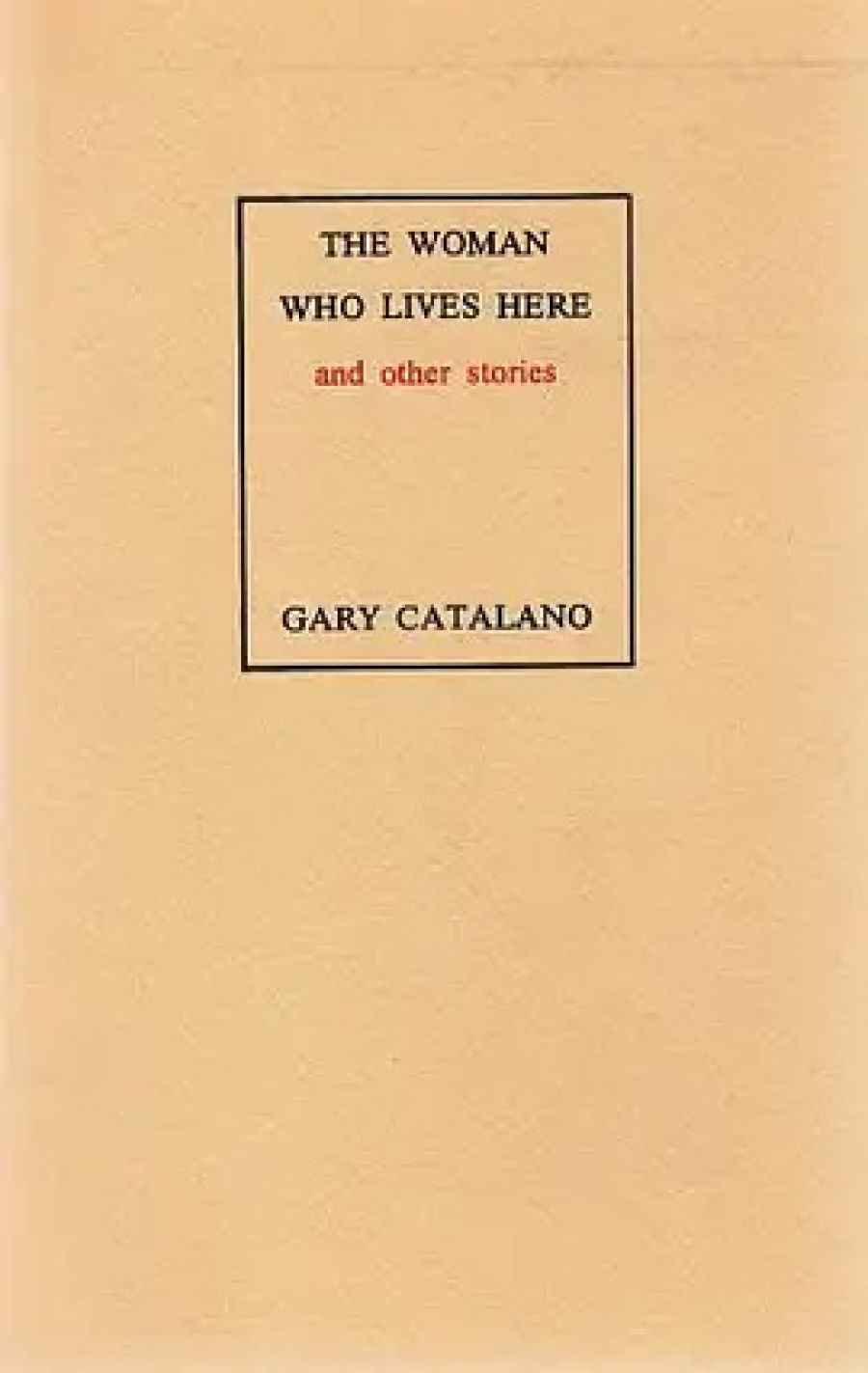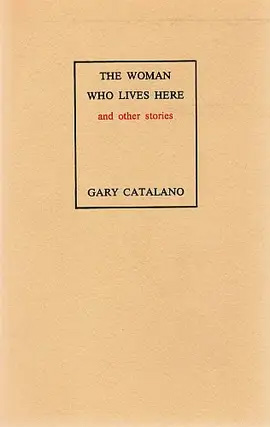
- Free Article: No
- Contents Category: Fiction
- Review Article: Yes
- Article Title: Still Lives
- Online Only: No
- Custom Highlight Text:
Gary Catalano is perhaps better known for his poetry and art-criticism rather than as a writer of short fiction. The Woman Who Lives Here, a book which contains five short stories and sixteen ‘Sketches’, will do little to alter this. For though the writing is stylistically unexceptionable, Catalano's material is perilously thin, lacking in dramatic situation, intellectual vigour and point. Of the five stories which comprise the opening section of the book, four deal with those ubiquitous themes of ‘modernism’: alienation and absence. Given the by now long and rich literary heritage which concerns itself with these concepts it is hardly surprising to find that Catalano's various formal devices rely heavily on earlier models. Techniques of discontinuity, fragmentary notes and deliberate concealments are variously used in these stories giving them an air of unresolved mystery and sometimes menace. But unlike the pioneers in such forms Catalano seems to be experimenting for experimentation's sake; no pressure of feeling informs the writing, leaving the reader with a sense of the writer's ennui, as well as that of his characters.
- Book 1 Title: The Woman Who Lives Here and Other Stories
- Book 1 Biblio: Champion Books, $5.00 pb, 80 pp
- Book 1 Cover Small (400 x 600):

- Book 1 Cover (800 x 1200):

- Book 2 Title: Point of View
- Book 2 Biblio: The Tasmanian Fellowship of Australian Writers, 125 pp
- Book 3 Title: Under Mount Egmont and Other Poems
- Book 3 Biblio: Neptune Press, $5.95 ph. 70 pp
The title story, ‘The Woman Who Lives Here’, with somewhat laboured irony, tells of the woman's unexplained absence. The man thus abandoned is left to look after ‘the boy’ and ‘the dog’; much of the story is given over to the various offices ‘the man’ performs for these two, whilst apparently having no relationship or connection with either. The story ends with the man, who is also the narrator, concluding that the woman is not going to return. ‘Moments’ and ‘Sociology One’ are similarly invigorating and ‘Midnight’, a Kafkaesque monologue, is merely incomprehensible. The section ends with ‘The Old Man on the Hill’, a more conventional third person narration, which tells of the contentment of an illiterate pensioner who works his land in accustomed ways and will do until he dies. The story is a cliche and betrays, I think, a somewhat sentimental nostalgia for a legendary past.
The ‘Sixteen Sketches’ which comprise the second part of the book, entitled ‘The Boarding House’, are aptly labelled. Each two page piece describes some character or incident met with in boarding houses the narrator has occupied. The sketches are so faintly drawn that it is difficult to tell whether they are supposed to be celebratory or denigratory towards the various people described.
Cumulatively the sketches are mimetic insofar as they portray the fragility of the random relationships entered into within the boarding house. But Catalano falls into the trap of mimetic art since the writing seems as inconsequential and tedious as the experiences they describe. In the last piece in the book a second person narration is utilised instead of the more common first-person. It is another portrait of alienation and tedium vitae. “If only you knew more people”, the narrator sighs to himself and then goes on:
There is a mirror in the corner of the room, and when you can find nothing else to do you often stand before it and talk to yourself. It seems a natural thing to do.
It is not difficult to believe, having read this book, that the author finds talking to himself ‘natural’. This is disappointing particularly when one considers that ‘many of these pieces’ were written on a General Writing Grant from the Australia Council.
It is needless to wield too heavy strictures against the contributors to Point of Flew, an anthology of short stories, articles and poetry from the Tasmanian Fellowship of Australian Writers. For presumably most of these authors are enthusiasts who write from those most admirable motives, for fun and pleasure, rather than with a view to establishing a sustained literary’ output and reputation. On the other hand it is a great delight to find amongst the twelve stories in the book three which are very good indeed. Gerda Shelton’s ingeniously structured ‘Selina’ tells of a lonely spinster’s delusion that the man who visits her regularly is in love with her. We enter into this delusion just as at the close of the story we momentarily share Selina’s bewildered response to an overheard conversation between her supposed lover and one of his colleagues. Implicit in the dialogue is the fact that Selina's ‘lover’ is in fact a social worker doing house calls. The irony is neatly handled and the story moving. Barney Roberts’ piece ‘Goodbye Jasper’ is an unsentimental account of a homosexual’s somewhat tortured relationship with his parents and particularly with his father. And M.M. Guy provides in ‘On Hearing you can Tan in the Snow too’ a trenchant study of the psychology of male sexual chauvinism. This last story is full of dramatic vigour and nice insight; the notion of tanning in the snow is wielded with sharp symbolic irony since the protagonist is metaphorically being ‘frozen’ by his wife.
Of the poetry in the volume the less said, I think, the better and although in the majority of the ‘articles’ there is little to complain of, there is little to cause excitement. One would, however question the editors’ wisdom in publishing a piece entitled ‘Belfast prepares for the Twelfth’, which describes what used to be the carnival atmosphere leading up to Orange Day celebrations. The writer, determined to be jolly, makes no reference whatsoever to the tragic sectarian struggles and violence of the past twenty years, an omission which I find deeply insensitive. But worse than this is the fact that implicitly if not explicitly this naive piece of writing is offensive to the Catholic and Republican interests, and thereby needlessly fuels the already embittered debates as to the political future of Northern Ireland.
Unlikely to provoke any such sharp controversies is Max Richard’s volume Under Mount Egmont and Other Poems. This consists of two longish sequences, ‘Red Letter Days’ and ‘Under Mount Egmont’ together with occasional poems written in a variety of styles and dealing, as the blurb tells us, with the author’s experience of student life, travels in Scotland and elsewhere, and of settling in Australia. Clearly the collection has been accumulated over a considerable period of time. And although this might indicate Richards’ admirable reticence towards bursting into print, it also has resulted in the volume having a rather ad hoc air about it. We move from the mellifluous and somewhat grandiloquent rhetoric of ‘Hawke’s Bay’, to the more chiselled rhyming couplets of ‘A Life’, through an Audenesqe parody in ‘Householders’ and thence to the symbolism of ‘High Country’ and the cosy domestic-suburban lyrics, ‘Boxing Day Leeds’ and ‘Reading to Jennifer’. Richards manages this variety of forms with considerable aplomb and the poems I have mentioned are among the best in the book. But what is missing is the force of a personal voice and vision.
‘Red Letter Days’ and ‘Under Mount Egmont' go some way, but not far enough, to rectify this. The former sequence is subtitled ‘La Trobe University 1972’, (the institution where the author teaches), and represents a rather cynical attack on the mores of the time. Nobody escapes attack but it seems to me unfortunate that students receive the most condescending villification and the author the least. The poem closes with the following lines with their sinister political implications:
Prowl-cars are alert for miscreants.
Miscreants prowl with spray-paints in their hands,
Flinging themselves into captivity
To prove the system's totally repressive.
The men in blue behave as is expected.
They know they belong to one another.
This prosaic style offers itself as polemic and one cannot but respond to it as such. Given that earlier in the sequence we have heard of students painting slogans against the Vietnam war, these lines strike me not only as reactionary but also intellectually facile.
More celebratory and much less objectionable is ‘Under Mount Egmont’ which concerns itself with the author’s childhood spent in New Zealand as the son of a country school master. Richards owes much in these poems to the Lowell of Life Studies and Joyce’s interior monologue at the opening of Portrait of the Artist as a Young Man, but he does not achieve the universality, the symbolic trenchancy, of his masters. Too much detail in the poems is too personal and they lack economy. Still they are not unpleasant to read and perhaps my response is not as full as it might be given that my childhood was not spent in the country, in New Zealand or in the Second War.


Comments powered by CComment